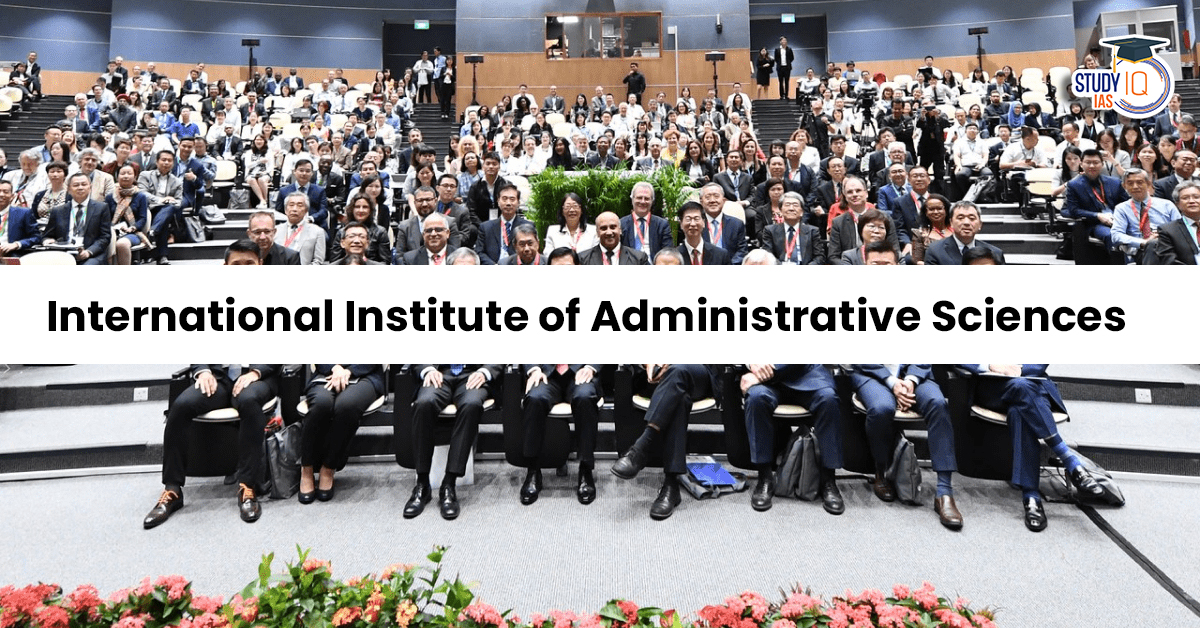Table of Contents
The International Institute of Administrative Sciences (IIAS) is a global organization that promotes excellence in public administration, governance research, and policy innovation. Established in 1930 and headquartered in Brussels, Belgium, IIAS serves as a bridge between governments, academic institutions, and practitioners around the world.
With nearly a century of contribution to administrative reforms and governance capacity-building, IIAS continues to play a key role in shaping the future of effective and transparent public administration.
In 2025, IIAS entered a new chapter as India assumed its presidency, marking a historic milestone in global administrative collaboration.
Objectives and Mission of IIAS
The International Institute of Administrative Sciences aims to:
-
Promote comparative research in public administration and governance.
-
Encourage capacity building among member countries through training and conferences.
-
Strengthen international cooperation in administrative reforms.
-
Foster innovation, transparency, and citizen-centric governance models.
-
Serve as a neutral platform for dialogue between academics, administrators, and policymakers.
IIAS emphasizes the importance of effective governance systems that adapt to emerging global challenges such as digital transformation, climate governance, and inclusive policymaking.
Structure of IIAS
The IIAS operates through several components that support its global mission:
-
General Assembly – The main decision-making body comprising representatives from member countries.
-
Council of Administration – Oversees strategic directions and research programs.
-
IASIA (International Association of Schools and Institutes of Administration) – Focuses on education, training, and professional development in public administration.
-
EGPA (European Group for Public Administration) – Encourages regional cooperation among European nations.
-
Research and Publications – IIAS publishes the International Review of Administrative Sciences (IRAS), a leading journal in the field of public governance.
India’s Presidency of IIAS (2025–2028): A Historic Achievement
In June 2025, India assumed the presidency of IIAS for the first time in history, marking a proud moment for the country’s administrative and academic community.
This victory demonstrated India’s growing global influence in governance reforms and public policy innovation. The Indian representative, V. Srinivas (Secretary, Department of Administrative Reforms and Public Grievances), was elected as President of IIAS after securing a majority of votes from member nations.
India’s leadership at IIAS aims to:
-
Strengthen South-South cooperation in governance.
-
Promote digital public infrastructure and citizen-centric service delivery models.
-
Encourage reforms in global governance metrics.
-
Build partnerships for training and innovation across Asia, Africa, and Europe.
This presidency aligns with India’s domestic mission to create a responsive, technology-driven, and accountable public administration framework.
Proposal for a New International Governance Index
Under India’s presidency, IIAS has proposed the development of a new International Governance Index (IGI) — a transformative global framework designed to measure the quality of governance more objectively and scientifically.
Why is a New Index Needed?
Current global indices often rely on perception-based methodologies, which may not accurately reflect the realities of governance in developing nations. India’s vision is to introduce a data-driven and transparent index that incorporates:
-
Real-time governance performance data
-
Citizen feedback mechanisms
-
Public service delivery efficiency
-
Digital governance parameters
-
Anti-corruption and transparency indicators
The proposed index aims to establish a fair and balanced global assessment system, acknowledging each country’s unique socio-political context.
This initiative is expected to be discussed in upcoming IIAS global conferences in 2026, and could redefine how nations measure administrative performance worldwide.
Key Focus Areas of IIAS in 2025
-
Digital Governance Transformation – Promoting AI, e-governance, and digital platforms for efficient service delivery.
-
Climate and Environmental Administration – Integrating sustainability into national administrative systems.
-
Ethical Leadership in Public Service – Strengthening accountability and integrity frameworks.
-
Administrative Capacity Building – Enhancing training for civil servants and policymakers.
-
Global Collaboration and Research – Expanding partnerships across continents for administrative innovation.
Recent Events and Vision for the Future
In 2025, IIAS celebrated EGPA@60, reaffirming its commitment to reforming global administrative practices.
The five core commitments outlined during the anniversary included:
-
Strengthening global research networks.
-
Promoting inclusive and gender-responsive governance.
-
Building a culture of integrity in public administration.
-
Adopting evidence-based policymaking.
-
Advancing international cooperation for capacity development.
Under India’s leadership, IIAS has also emphasized the importance of digital transformation and ethical governance, aiming to prepare administrative systems for the challenges of the 21st century.
Significance of IIAS for Global Governance
The IIAS serves as a catalyst for innovation and reform in public administration. Its contribution extends to:
-
Creating a global network for knowledge exchange among public servants.
-
Encouraging governments to adopt performance-based governance models.
-
Helping nations design citizen-first administrative systems.
-
Supporting developing countries through training, advisory, and academic programs.
By bridging the gap between theory and practice, IIAS plays a crucial role in building competent, transparent, and accountable administrative structures across the world.
Conclusion
The International Institute of Administrative Sciences (IIAS) stands as a global pillar of knowledge and collaboration in governance and public administration.
With India leading the institute from 2025 to 2028, the focus on ethical leadership, innovation, and global cooperation is stronger than ever. The proposal for a new International Governance Index reflects a shift toward more objective, inclusive, and transparent assessment frameworks in global governance.
As the world grapples with challenges like digitalization, climate change, and public trust, IIAS’s mission remains clear — to create administrative systems that are responsive, accountable, and future-ready.


 US–Israel Attack on Iran 2026: Khamene...
US–Israel Attack on Iran 2026: Khamene...
 Agentic AI vs AI Agents: Meaning, Differ...
Agentic AI vs AI Agents: Meaning, Differ...
 Prahaar Missile System: Range, Features ...
Prahaar Missile System: Range, Features ...




















